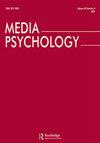他们也会救我吗?当英雄是黑vs白时,受害者种族回忆及其对互惠预期的影响
IF 2.6
2区 心理学
Q1 COMMUNICATION
引用次数: 2
摘要
有界广义互惠(BGR)假设互惠期望为内群体偏爱和外群体贬损提供了基础。这些期望会受到与外群体成员互动的影响,包括通过媒体的替代互动。本分析考察了非黑人参与者如何看待黑人个体的帮助行为,以及他们对帮助情景的解释如何影响群体间的态度。参与者(n= 211)被随机分配观看一段新闻片段,其中一个黑人或白人英雄拯救了一个白人,或者一个没有描述种族的人。当观看带有模糊受害者的视频片段时,当英雄是黑人时,参与者更有可能报告受害者不是白人,这表明白人和黑人之间有帮助行为的期望。然而,当一个黑人英雄救了一个明显的白人受害者时,参与者的回忆更加准确。受害者种族回忆和英雄种族相互作用预测未来的互惠预期,例如黑人英雄拯救被回忆为白人的受害者(无论准确性如何)导致积极互惠预期的增加。积极互惠预测了避免偏见和偏见态度的动机。这些结果暗示了媒体对帮助行为的描述如何影响群体间的信仰和态度。本文章由计算机程序翻译,如有差异,请以英文原文为准。
Would they save me, too? Victim race recall when the hero is Black vs. White and its influence on expectations of reciprocity
ABSTRACT Bounded Generalized Reciprocity (BGR) hypothesizes that expectations of reciprocity provide the foundation for ingroup favoritism and outgroup derogation. These expectations can be influenced by interaction with outgroup members, including vicarious interaction through media. This analysis examines how non-Black participants view helping behavior by Black individuals, and how their interpretations of helping scenarios influence intergroup attitudes. Participants (n= 211) were randomly assigned to view a news clip in which a Black or White hero saves someone White, or whose race was not portrayed. When viewing a clip with an ambiguous victim, participants were significantly more likely to report that the victim was not White when the hero was Black – indicating an expectation of helping behavior between Whites and Blacks. However, when a Black hero saved an unambiguously White victim, participants were more accurate in their recall. Victim race recall and hero race interacted to predict future reciprocity expectations, such that Black heroes saving a victim recalled as White (regardless of accuracy) resulted in increased positive reciprocity expectations. Positive reciprocity then predicted motivation to avoid prejudice and prejudiced attitudes. These results have implications for how media depictions of helping behaviors may impact intergroup beliefs and attitudes.
求助全文
通过发布文献求助,成功后即可免费获取论文全文。
去求助
来源期刊

Media Psychology
Multiple-
CiteScore
8.60
自引率
7.10%
发文量
30
期刊介绍:
Media Psychology is an interdisciplinary journal devoted to publishing theoretically-oriented empirical research that is at the intersection of psychology and media communication. These topics include media uses, processes, and effects. Such research is already well represented in mainstream journals in psychology and communication, but its publication is dispersed across many sources. Therefore, scholars working on common issues and problems in various disciplines often cannot fully utilize the contributions of kindred spirits in cognate disciplines.
 求助内容:
求助内容: 应助结果提醒方式:
应助结果提醒方式:


